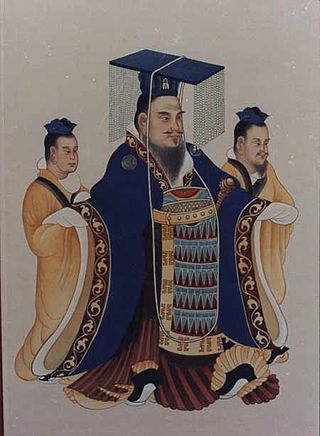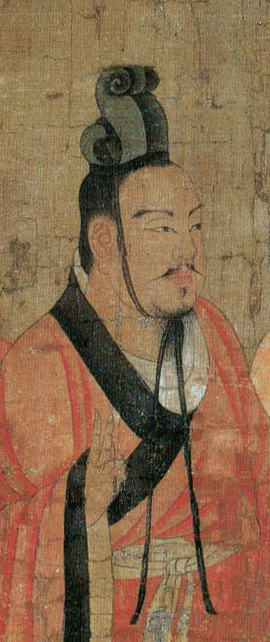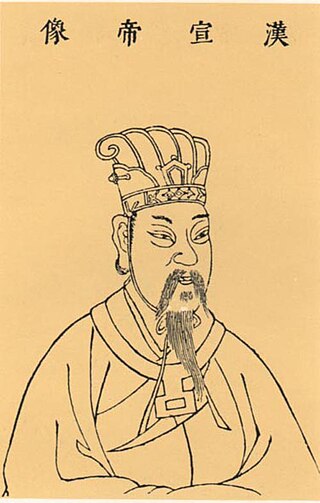Related Research Articles

The Warring States period in Chinese history comprises the final centuries of the Zhou dynasty, which were characterized by warfare, bureaucratic and military reform, and political consolidation. It followed the Spring and Autumn period and concluded with the wars of conquest that saw the state of Qin annex each of the other contender states by 221 BC and found the Qin dynasty, the first imperial dynastic state in East Asian history.

Wei was one of the seven major states during the Warring States period of ancient China. It was created from the three-way Partition of Jin, together with Han and Zhao. Its territory lay between the states of Qin and Qi and included parts of modern-day Henan, Hebei, Shanxi, and Shandong. After its capital was moved from Anyi to Daliang during the reign of King Hui, Wei was also called Liang.
King Hui of Wei, also known as King Hui of Liang, personal name Wei Ying, was a monarch of the Wei state, reigning from 369 BC to 319 BC. He initially ruled as marquess, but later elevated himself to kingship in 344 BC. He was a grandson of Marquess Wen, the founder of the state, and a son of his predecessor, Marquess Wu. He was succeeded by his son, King Xiang.

Zhao was one of the seven major states during the Warring States period of ancient China. It emerged from the tripartite division of Jin, along with Han and Wei, in the 5th century BC. Zhao gained considerable strength from the military reforms initiated during the reign of King Wuling, but suffered a crushing defeat at the hands of Qin at the Battle of Changping. Its territory included areas in the modern provinces of Inner Mongolia, Hebei, Shanxi and Shaanxi. It bordered the states of Qin, Wei, and Yan, as well as various nomadic peoples including the Hu and Xiongnu. Its capital was Handan, in modern Hebei province.

Emperor Wu of Han, born Liu Che and courtesy name Tong, was the seventh emperor of the Han dynasty from 141 to 87 BC. His reign lasted 54 years – a record not broken until the reign of the Kangxi Emperor more than 1,800 years later – and remains the record for ethnic Han emperors. His reign resulted in a vast expansion of geopolitical influence for the Chinese civilization, and the development of a strong centralized state via governmental policies, economical reorganization and promotion of a hybrid Legalist–Confucian doctrine. In the field of historical social and cultural studies, Emperor Wu is known for his religious innovations and patronage of the poetic and musical arts, including development of the Imperial Music Bureau into a prestigious entity. It was also during his reign that cultural contact with western Eurasia was greatly increased, directly and indirectly.

Emperor Zhao of Han, born Liu Fuling (劉弗陵), was the eighth emperor of the Han dynasty from 87 to 74 BC. Emperor Zhao was the youngest son of Emperor Wu.

Emperor Xuan of Han, born Liu Bingyi (劉病已), was the tenth emperor of the Han dynasty, reigning from 74 to 48 BC, and was one of the only four Western Han emperors to receive a temple name. During his reign, the Han dynasty prospered economically and militarily became a regional superpower, and was considered by many to be the peak period of the entire Han history. His time of rule, along with his predecessor Emperor Zhao's are known by historians as Zhaoxuan Restoration (昭宣中興). He was succeeded by his son Emperor Yuan after his death in 48 BC.
Emperor Ping of Han, personal names Liu Jizi and later Liu Kan, was the eleventh emperor of the Chinese Han dynasty, reigning from 1 BC to AD 6. He ascended the throne at the age of eight following the death of his cousin, the childless Emperor Ai. Wang Mang was appointed regent by Grand Empress Dowager Wang Zhengjun. Dissatisfied with his father's dictatorial regency, in AD 3, Wang's son Wang Yu (王宇) conspired with Emperor Ping's maternal uncles of the Wei clan against the regent, but after they were discovered, Wang Mang had not only Wang Yu and the Weis put to death, but also used this opportunity to accuse many actual or potential political enemies as being part of the conspiracy and to execute or exile them. From then onwards, the Han dynasty existed only in name. Furthermore, Wang Mang also designated his daughter as the empress consort to Emperor Ping to codify his legitimacy to power. Emperor Ping was allegedly poisoned by Wang Mang after reigning less than six years because Wang was concerned that he would avenge his uncles, and his successor, the infant Ruzi Ying, would be chosen by none other than Wang Mang himself.

Jin, originally known as Tang (唐), was a major state during the middle part of the Zhou dynasty, based near the centre of what was then China, on the lands attributed to the legendary Xia dynasty: the southern part of modern Shanxi. Although it grew in power during the Spring and Autumn period, its aristocratic structure saw it break apart when the duke lost power to his nobles. In 403 BC, the Zhou court recognized Jin's three successor states: Han, Zhao, and Wei. The Partition of Jin marks the end of the Spring and Autumn period and the beginning of the Warring States period.
Wei Zifu, posthumously known as Empress Si of the Filial Wu or Wei Si Hou, was an empress consort during ancient China's Han dynasty. She was the second wife of the famous Emperor Wu and his spouse for 49 years. She stayed as his empress for 38 years, the second longest in Chinese history. She was the mother of Emperor Wu's heir apparent Liu Ju and a great-grandmother of Liu Bingyi, as well as an older half-sister of the famed general Wei Qing, a younger aunt of Huo Qubing, and a step-aunt of Han statesman Huo Guang.

Huo Qubing was a Chinese military general and politician of the Western Han dynasty during the reign of Emperor Wu of Han. He was a nephew of the general Wei Qing and Empress Wei Zifu, and a half-brother of the statesman Huo Guang. Along with Wei Qing, he led a campaign into the Gobi Desert of what is now Mongolia to defeat the Xiongnu nomadic confederation, winning decisive victories such as the Battle of Mobei in 119 BC. Huo Qubing was one of the most legendary commanders in Chinese history, and still lives on in Chinese culture today.

Huo Guang, courtesy name Zimeng (子孟), was a Chinese military general and politician who served as the dominant state official of the Western Han dynasty from 87 BCE until his death in April 68 BCE. The younger half-brother of the renowned general Huo Qubing, Huo was a palace aide to Emperor Wu and secured power in his own right at the emperor's death, when he became principal co-regent for Emperor Zhao. Huo outmaneuvered his colleagues in the regency and assumed personal control over state affairs, consolidating his power by installing family members and other loyalists in key offices. Following Emperor Zhao's death in June 74 BCE, Huo engineered the succession and deposition of Liu He within a mere 27 days. Huo next facilitated the accession of Emperor Xuan and retained control of the Han government until his death.
Wei Qing, courtesy name Zhongqing, born Zheng Qing in Linfen, Shanxi, was a Chinese military general and politician of the Western Han dynasty who was acclaimed for his campaigns against the Xiongnu, and his rags to riches life. He was a consort kin of Emperor Wu of Han as the younger half-brother of Emperor Wu's wife Empress Wei Zifu, and later the third husband of Emperor Wu's older sister Eldest Princess Yangxin. He was also the maternal uncle of Huo Qubing, another decorated Han general who participated in the war against the Xiongnu.
Liang was a traditional Chinese fief centered on present-day Kaifeng. It was held by various powers over the course of Chinese history. It generally comprised modern Henan with a small part of Shanxi.

King Zhaoxiang of Qin, also abbreviated as King Zhao of Qin (秦昭王), born Ying Ji (嬴稷), was the king of the Qin state from 306 BC to 251 BC. He was the son of King Huiwen and younger brother of King Wu.

Marquess Wen of Wei, personal name Wei Si, was the founding marquess of the Wei state. He belonged to the Wei clan, one of the noble houses that dominated Jin politics in the 5th and 6th centuries BC.
Marquess Lie of Zhao, personal name Zhao Ji, was the founding marquess of the Zhao state during the Warring States period of China. His father was Count Xian.
King Su of Chu was the king of the state of Chu from 380 BC to 370 BC during the Warring States period of ancient China. He was born Xiong Zang and King Su was his posthumous title. King Su succeeded his father King Dao of Chu, who died in 381 BC.
Marquess Wu or variants may refer to:
References
- Sima Qian, "Records of the Grand Historian"
- Yang Chang, "History of the Warring States", Taiwan Commercial Press, 1997